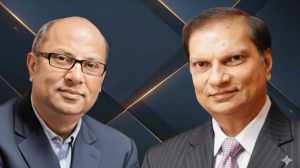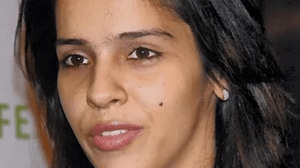Jinnah great man, stood for secular Pak: Advani
At Karachi’s highest natural point, L K Advani, leader of the Opposition in the Lok Sabha, paid a solemn tribute to Mohammed Ali Jinnah...

At Karachi’s highest natural point, L K Advani, leader of the Opposition in the Lok Sabha, paid a solemn tribute to Mohammed Ali Jinnah, the founder of Pakistan, this morning. In an affirmation of reconciliation and understanding, he described Jinnah as an ambassador of Hindu-Muslim unity— and recalled the spirit of secularism that drove the Muslim League leader’s address to the Pakistan Constituent Assembly in August 1947.
The visit to the Quaid-e-Azam mausoleum was the first item on the BJP president’s itinerary in Karachi and preceded a fond reception at his alma mater, St Patrick’s High School. He termed it ‘‘my respectful homage to the great man.’’
Ascending the white marble-stepped pyramid after a sound alert by the naval band, Advani placed a wreath of red and yellow roses at the replica of Jinnah’s tomb. Under a high blue dome, Maulana Liaquat recited the Sura Fateha from the Quran. Then the naval band rendered Pakistan’s national anthem, Quami Tarana by Hafiz Jalandhari.
He later wrote in the visitors’ book: ‘‘There are many people who leave an inerasable stamp on history. There are very few who actually create history. Quaid-e-Azam Mohammed Ali Jinnah was one such rare individual. Sarojini Naidu, a leading luminary of India’s freedom struggle, described Mr Jinnah as an ambassador of Hindu-Muslim unity. His address to the Constituent Assembly of Pakistan on August 11, 1947 is really a classic, a forceful espousal of a secular state in which, while every citizen would be free to practise his own religion, the state shall make no distinction between one individual and another on grounds of faith. My respectful homage to the great man.’’
‘‘This is an honour for us,’’ said Major (Retd) Ather Mir, caretaker of the mausoleum, ‘‘that the leader of the opposition in India has come to pay homage here.’’
The ninety-foot summit provides a vantage point to survey the tangled geography of the subcontinent. Squinting into the mid-morning sea breeze, provincial policemen point to the near distance. There in the vicinity of the blind school is Jamshed Quarters, where the Advanis had a family home.
Jinnah, too, was born in Karachi. Though he spent most of his working life in Bombay and London, he returned to the city after gaining a separate successor state when the British empire receded. He would die here on September 11, 1948.
The search for an appropriate memorial for the Founder of Pakistan was a long and arduous process. Various designs were offered to his sister Fatima for approval. But she was not impressed and, finally in 1960, drafted an architect from Bombay, Yahya C. Merchant, who had also planned Jinnah House.
Last year, Jinnah’s only and estranged daughter Dina Wadia visited the mausoleum for the first time. She had said it was ‘‘a sad and wonderful occasion’’ for her. That marked a personal reconciliation. A year later, the BJP president’s inscription in the visitors’ book is certain to reinforce a political message that India is accepting of and comfortable with a separate Pakistan.
This was what he underlined at a function organized by the South Asian Free Media Association in Lahore just two days ago: ‘‘I would like all the people of Pakistan to know that neither the BJP nor, for that matter, any section of India’s polity wishes ill towards Pakistan. Let there be no place for anti-Indianism in Pakistan, and no place for anti-Pakistanism in India. Specifically, as far as my party is concerned, I would like all the people of Pakistan to know that the emergence of India and Pakistan as two separate, sovereign and independent nations is an unalterable reality of history. I am stating this only because I find that there are still some misconceptions and false propaganda about what the BJP thinks of Pakistan. In fact, this propaganda has no leg to stand now since it is a BJP-led government which started the peace process in 1999 and steadfastly continued it throughout the six years we were in office. Even now, when we are in opposition, we have been supporting it equally vigorously.’’
In that address, he campaigned for patience in resolving all outstanding issues between the two countries and said that ‘‘no solution can work if it is sought through non-peaceful means.’’
He has been repeating, over this week, that this is why he considers the January 2000 joint statement between the then prime minister, Atal Behari Vajpayee, and Pakistan president Pervez Musharraf the turning point in bilateral relations.
‘‘The contents and commitments of that joint statement,’’ he explained, ‘‘flow from a mutual understanding that terrorism is indeed an enemy of the entire humanity, and can have no protection in any civilized country.’’
This is Advani’s second visit to Pakistan after he migrated from Karachi in 1947. Unlike the last time, however, he is accompanied by his family.




- 01
- 02
- 03
- 04
- 05



























